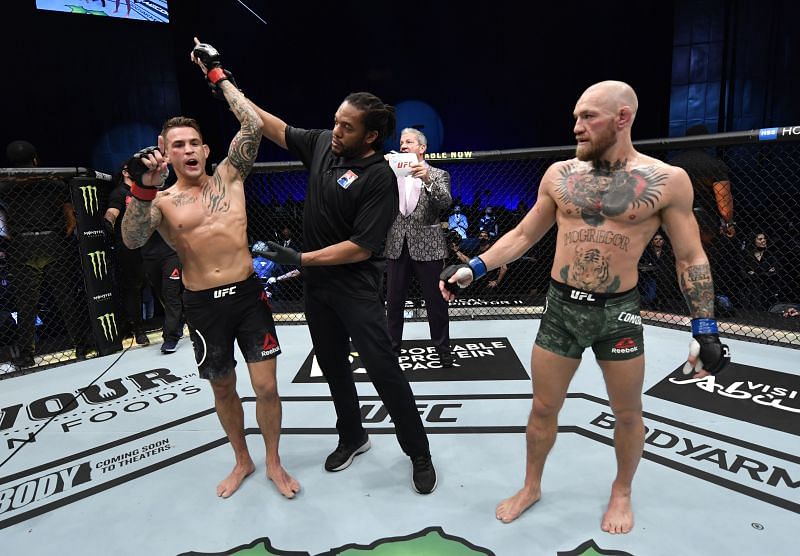
Why isn't Dustin Poirier interested in the UFC Lightweight title?
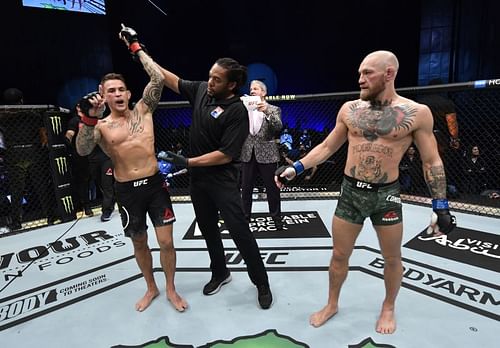
UFC 257 was undoubtedly one of the biggest UFC pay-per-views of all time.
The event – which took place this January at Abu Dhabi’s Fight Island facility, saw Dustin Poirier defeat the UFC’s biggest-ever superstar – Conor McGregor – in the main event.
In fact, The Diamond became the first man ever to stop Conor McGregor with strikes in the UFC, finishing him in the second round.
We don’t know exactly what Dustin Poirier’s payout from the event was, outside of the fact that he gained a $50k bonus.
But considering the status of McGregor and the huge spotlight that UFC 257 offered – drawing a reported 1.6m pay-per-view buys - it’d be hard to dispute the idea that the win was the biggest of Dustin Poirier’s UFC career.
So why, just over a month later, does it feel like Dustin Poirier’s victory is beginning to ring a little hollow? And why could his next move potentially define what the UFC is and represents going forward?
Should Dustin Poirier be fighting for the UFC Lightweight title next?
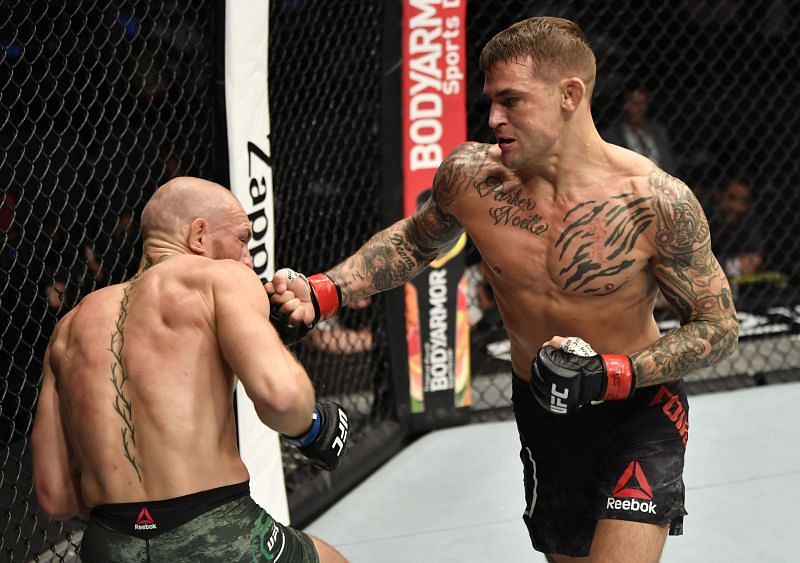
In past years, after picking up a win like his knockout of Conor McGregor, Dustin Poirier would undoubtedly have been handed an immediate shot at the UFC Lightweight title.
So why hasn’t this happened yet?
Well, there’s a couple of angles to look at here. The first one is obviously the status of current UFC Lightweight champion Khabib Nurmagomedov.
The Eagle last fought in October 2020, defeating Justin Gaethje to reel off his third successful UFC title defense.
After the fight, Nurmagomedov announced his retirement from MMA. But five months later, his UFC Lightweight crown has still not been vacated.
The reason for this is pretty obvious. The UFC believes that they can entice Nurmagomedov back into action and don’t want to strip him or force him to vacate the title while a potential return is still on the table.
That means that right now, the promotion is very reluctant to announce a Lightweight title fight not involving the Russian.
However, with every month that goes by, the chances of Khabib returning to defend his title seem to be getting slimmer.
With this in mind, it isn’t his fault that the UFC are reluctant to make an announcement regarding the Lightweight title. However, it’s definitely worth asking why Dustin Poirier isn’t making a bigger deal of things.
After all, he’s almost definitely earned a shot at the crown. In fact, in a world without Khabib – who represents Dustin Poirier’s only recent loss in the UFC – The Diamond is probably the UFC’s best Lightweight.
With this in mind, Dustin Poirier should almost certainly be pushing for a title shot. So why isn’t he doing so?
Does money or UFC glory motivate Dustin Poirier?
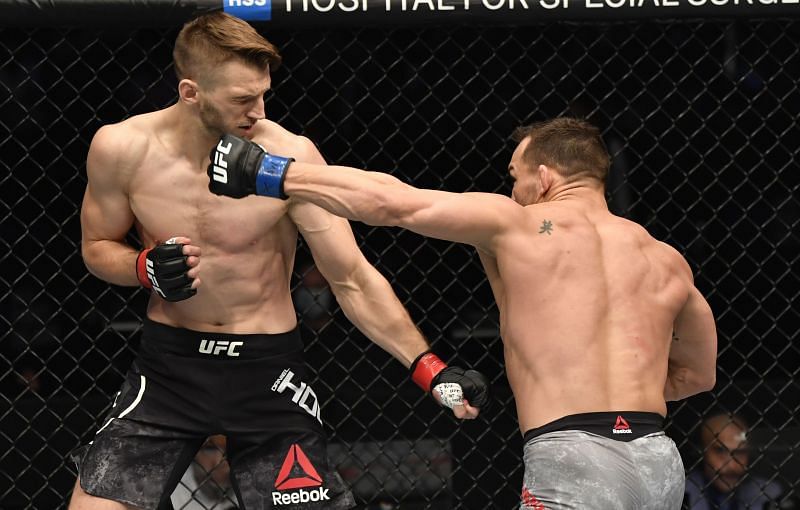
The likely reason that Dustin Poirier hasn’t pushed for a shot at the UFC Lightweight title is that it’d involve a fight with either Charles Oliveira or Michael Chandler next.
With Khabib almost certainly not coming back, Oliveira and Chandler represent the next best contenders in the division right now. Oliveira is coming off the biggest win of his UFC career over Tony Ferguson, while Chandler debuted in the UFC by spectacularly knocking out Dan Hooker.
However, neither man is well-known by casual fans, and neither comes close to the kind of star power that Conor McGregor brings to the table.
That means that even if the UFC Lightweight title were to be on the line, a fight between Dustin Poirier and either Oliveira or Chandler wouldn’t come close to that 1.6m buyrate mark.
And that’s the explanation as to why Dustin Poirier appears to be uninterested in fighting either man for the title – instead preferring to chase after a trilogy fight with McGregor or even a fight with Nate Diaz at 170lbs.
However, what’s most bizarre about this situation is that Dustin Poirier himself admits that Conor McGregor doesn’t warrant a title shot right now. This means that if their trilogy fight happens, it shouldn’t be for the gold.
In fact, reading into Dustin Poirier’s thoughts, all he seems to be motivated by is money.
Is that a bad thing? After all, combat sports like MMA and boxing are often referred to as “prize fighting,” meaning the idea for any athletes who get involved in them is to make the most money possible.
However, in an ideal world, that money would be made by the best in-ring – or cage – fighters. In 2021 though, that simply isn’t the case.
We now live in a world where fans can largely ignore massively skilled champions like Demetrious Johnson, Valentina Shevchenko, and Deiveson Figueiredo.
In a lot of cases, those same fans would rather splash out to watch borderline amateurish bouts involving YouTube stars like Jake Paul on pay-per-view than some of the UFC’s greatest fighters.
And somehow, that’s led to a situation where for a fighter like Dustin Poirier, another fight with Conor McGregor means more than the UFC Lightweight title.
Is this trend bad for the UFC? And who is to blame?
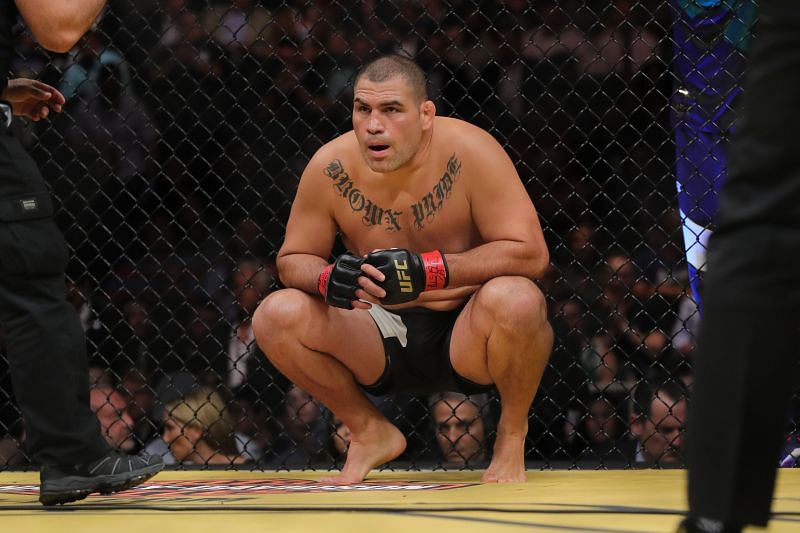
In all honesty, this wasn’t the case as recently as a decade ago.
Back then, the UFC were more than willing to push great fighters like Anderson Silva and Cain Velasquez as megastars despite their struggles to really catch on with casual fans.
If we’re honest, the idea of fighters chasing money rather than glory started with Conor McGregor's rise in 2015.
McGregor skyrocketed to the top of the UFC quickly after his debut in 2013 and definitely earned his shot at the UFC Featherweight title at UFC 194.
But after defeating Jose Aldo, the Irishman wasn’t content to simply stay in his division and defend his title as the likes of Silva, Georges St. Pierre, and Aldo himself had done.
Instead, he wanted to push for more – meaning more glory and more money. It was McGregor who began the “money fight” trend with his clashes with Nate Diaz and his chase for the UFC Lightweight title.
And of course, seeing the dollars that he could bring in, the UFC was more than happy to oblige.
However, by doing so, the promotion may have inadvertently signed its own death warrant.
The UFC always traditionally ensured that its own brand was pushed over and above that of any individual fighter.
That seemed to safeguard them against the idea of a fighter simply leaving the UFC to promote their own fights. It also meant that when stars like Randy Couture and Tito Ortiz departed, the UFC could simply continue to roll.
Is that really the case now, though, when a fighter like Dustin Poirier is no longer motivated by winning the UFC Lightweight title?
What should the UFC do from here?
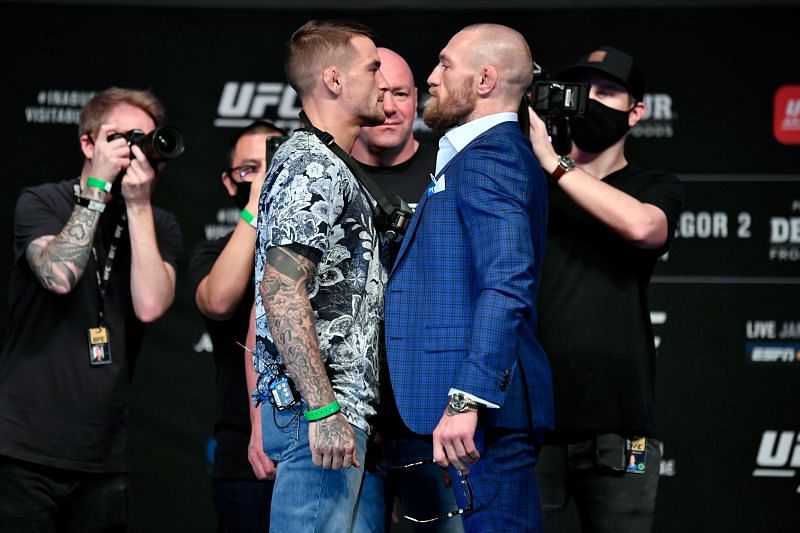
In a lot of respects, it could be argued that the genie is simply out of the lamp now, and for the UFC, there’s no way back. But that isn’t the case.
The UFC now has two paths that they could attempt to travel.
One is that they massively up the paycheques of anyone holding UFC titles, regardless of whether they’re considered a big star by casual fans.
That’d obviously cost the promotion a lot of money – particularly if said champion wasn’t capable of drawing millions on pay-per-view. But it’d definitely ensure that UFC gold would become the main goal of any fighter stepping into the Octagon.
The other path is that they basically roll the dice – and make Dustin Poirier vs. Conor McGregor III for the vacant UFC Lightweight title.
Sure, the likes of Charles Oliveira and Michael Chandler would likely be furious with that. After all, McGregor certainly doesn’t deserve a title shot right now.
But with the way their last fight went, it’d almost be certain that Dustin Poirier would defeat the Irishman.
Not only would that arguably smash McGregor’s reputation for good, but it would also mean Dustin Poirier would hold the UFC Lightweight title. He would become part of the UFC machine in the process, rather than sitting almost on the outside as he is now.
Incredibly, this could well prove to be a tipping point for the UFC. If they can get their next move right, then they can continue to dominate the MMA market for years to come.
Get it wrong, though, and the sport of MMA will continue to lurch worryingly towards the same messy territory occupied by boxing.
The ball is now in the UFC’s court – and the choice is theirs.